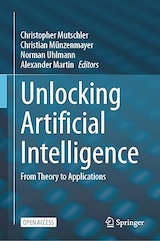
|
FreeComputerBooks.com
Links to Free Computer, Mathematics, Technical Books all over the World
|
|
- Title: Unlocking Artificial Intelligence: From Theory to Applications
- Author(s) Christopher Mutschler, Christian Münzenmayer, Norman Uhlmann, Alexander Martin
- Publisher: Springer; 2024th edition (July 30, 2024); eBook (Creative Commons Licensed)
- License(s): Creative Commons License (CC)
- Hardcover: 396 pages
- eBook: PDF and ePub
- Language: English
- ISBN-10: 3031648315
- ISBN-13: 978-3031648311
- Share This:

|
This open access book provides a state-of-the-art overview of current machine learning research and its exploitation in various application areas. It has become apparent that the deep integration of artificial intelligence (AI) methods in products and services is essential for companies to stay competitive.
About the Authors- Christopher Mutschler is Director of the Positioning and Networks Division at Fraunhofer IIS.
- Artificial Intelligence and Logic Programming
- Machine Learning
- Neural Networks and Deep Learning
- Robotics and Robot Programming

- Unlocking Artificial Intelligence: From Theory to Applications (Christopher Mutschler, et al.)
- The Mirror Site (1) - PDF
-
 Demystifying Artificial Intelligence: Symbolic, Data-Driven, etc.
Demystifying Artificial Intelligence: Symbolic, Data-Driven, etc.
This book is intended for business professionals that want to understand the fundamental concepts of Artificial Intelligence, their applications and limitations. Demystifying AI through fundamental concepts and industry examples.
-
 Applied Artificial Intelligence: A Handbook For Business Leaders
Applied Artificial Intelligence: A Handbook For Business Leaders
This book is a practical guide for business leaders who are passionate about leveraging machine intelligence to enhance the productivity of their companies and the quality of life in their communities.
-
 The Road to General Intelligence (Jerry Swan, et al.)
The Road to General Intelligence (Jerry Swan, et al.)
In this book, the authors argue that the framework of machine learning is fundamentally at odds with any reasonable notion of intelligence and that essential insights from previous decades of AI research are being forgotten.
-
 AI Demystified (Alex David Pratt)
AI Demystified (Alex David Pratt)
The book explores the potential of artificial intelligence to transform everyday life while highlighting both the benefits and risks. The book encourages readers to embrace AI responsibly, focusing on its impact on healthcare, creativity, and society.
-
 Mission AI: The New System Technology (Haroon Sheikh, et al.)
Mission AI: The New System Technology (Haroon Sheikh, et al.)
This open access book offers a strategic perspective on AI and the process of embedding it in society. After decades of research, Artificial Intelligence (AI) is now entering society at large.
-
 AI - Limits and Prospects of Artificial Intelligence (Peter Klimczak)
AI - Limits and Prospects of Artificial Intelligence (Peter Klimczak)
This book explores the limits of AI, describe the necessary conditions for its functionality, reveal its attendant technical and social problems, and present some existing and potential solutions.
-
 AI for Everyone? (Pieter Verdegem)
AI for Everyone? (Pieter Verdegem)
We are entering a new era of technological determinism and solutionism in which governments and business actors are seeking data-driven change, assuming that Artificial Intelligence is now inevitable and ubiquitous.
-
 Making AI Intelligible (Herman Cappelen, et al.)
Making AI Intelligible (Herman Cappelen, et al.)
Can humans and artificial intelligences share concepts and communicate? The questions addressed in the book are not only theoretically interesting, but the answers have pressing practical implications.
-
 What Was Artificial Intelligence? (Sue Curry Jansen)
What Was Artificial Intelligence? (Sue Curry Jansen)
Prescient autopsy of AI self-selling - the rhetoric of the masculinist sublime - is reprinted with a new introduction. Now an open access book, it's a message in a bottle, addressed to Musk, Bezos, and the latest generation of AI myth-makers.
-
 Artificial Intelligence: Foundations of Computational Agents
Artificial Intelligence: Foundations of Computational Agents
This text is a modern and coherent introduction to the field of Artificial Intelligence that uses rational computational agents and logic as unifying threads in this vast field. Many fully worked out examples, expanded coverage on machine learning material, etc.
-
 Robots and AI (Lili Yan Ing, et al)
Robots and AI (Lili Yan Ing, et al)
The book explains new approaches on how robots and artificial intelligence affect the world economy by presenting detailed theoretical framework and country-specific as well as firm-product level-specific exercises.
-
 Artificial Intelligence for Big Data (Anand Deshpande, et al)
Artificial Intelligence for Big Data (Anand Deshpande, et al)
You will learn to use machine learning algorithms such as k-means, SVM, RBF, and regression to perform advanced data analysis. You will understand the current status of machine and deep learning techniques to work on genetic and neuro-fuzzy algorithms.
-
 Artificial Intelligence for a Better Future (Bernd Stahl)
Artificial Intelligence for a Better Future (Bernd Stahl)
This book proposes a novel approach to Artificial Intelligence (AI) ethics. AI offers many advantages: better and faster medical diagnoses, improved business processes and efficiency, and the automation of boring work.
-
 On the Path to AI: Foundations of the Machine Learning Age
On the Path to AI: Foundations of the Machine Learning Age
This book explores machine learning and its impact on how we make sense of the world. It introduces readers to the key concepts of machine learning, discusses the potential applications and limitations of predictions generated by machines using data.
-
 The Amazing Journey of Reason: from DNA to Artificial Intelligence
The Amazing Journey of Reason: from DNA to Artificial Intelligence
This book analyses the evolution of complex structures (Organisms, or organized, living, systems) in the universe - from the subatomic particles after the Big Bang onwards - in order to understand the emergence of today's interconnected society.
-
 AI Art: Machine Visions and Warped Dreams (Joanna Zylinska)
AI Art: Machine Visions and Warped Dreams (Joanna Zylinska)
The book critically examines artworks that use AI, be it in the form of visual style transfer, algorithmic experiment or critical commentary. It also engages with their predecessors, including robotic art and net art.





